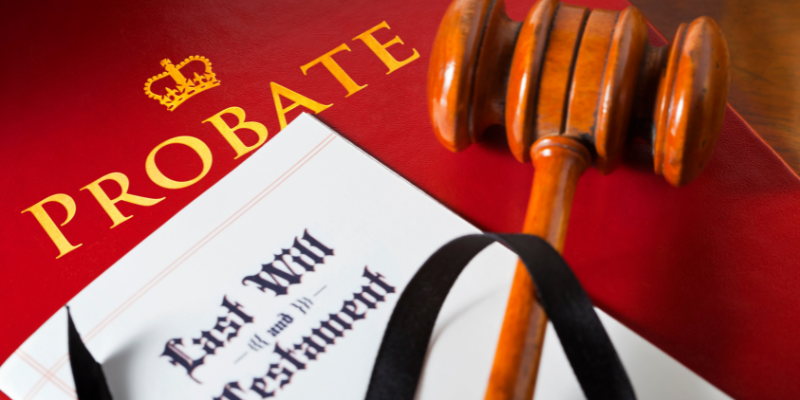
Can You Live In A House During Probate in Los Angeles, California?
Experiencing the loss of a loved one is one of the toughest things someone could go through. On top of dealing with the grief, you’re faced with practical matters, such as navigating the probate process. Living in Los Angeles can add to the stress, as California is known for having one of the more complex and time-consuming probate processes compared to other states. During this time, you likely have many questions swirling in your mind, and perhaps, at the forefront is the question of whether you can continue living in the house during the entire process. Let us help ease your concerns by answering a few key questions that can help you through the next steps with clarity and confidence.
Understanding Probate in Los Angeles

Probate is the court-supervised process of administering and validating a decedent’s estate according to the will, or under California’s intestate succession laws when there is no will. This legal process ensures that the estate is properly distributed to the designated beneficiaries or rightful heirs.
It is a complicated process that typically takes anywhere from 9 to18 months, depending on the size and complexity of the estate. The probate process starts once the executor files a petition to the Los Angeles County Superior Court. Until the court officially closes the probate case, the estate must continue to cover ongoing expenses such as bills, taxes, and mortgage payments, making the process potentially costly.
Here is a guide to important probate terms you should be familiar with:
- Decedent: The legal term for the deceased person whose estate is being administered.
- Estate: Refers to all assets owned by the decedent at the time of death, including real property (land, houses, buildings) and personal property (cars, jewellery, bank accounts, etc).
- Executor or Administrator: An executor is the person named in the will to carry out the decedent’s wishes, including asset distribution and debt payment. If there is no will, the court appoints an administrator to fulfill the same responsibilities. Do not get confused because both are synonymous with personal representation.
- Will: A legal document that outlines the decedent’s wishes regarding the distribution of their estate, including who should receive specific assets.
- Beneficiaries: Individuals or entities named in the will to receive a portion of the estate.
- Heirs: Individuals entitled to inherit the estate under intestate succession laws when there is no valid will.
- Intestate Succession: The legal framework that determines how the decedent’s estate is distributed when there is no will.
Surviving spouses and children are given first priority in inheritance, followed by parents, siblings, and then more distant relatives. In some cases, multiple heirs may inherit the estate. For a clearer understanding of the full inheritance order, check out this guide from a cash home buyer in Los Angeles and surrounding California cities.
Does The Property Need To Go Through Probate?
In most cases, real property must go through probate, even if there is a valid will, particularly when the value of the decedent’s estate exceeds California’s probate threshold of $184,500.
Fortunately, there are situations where probate can be avoided. For example, if the property was held in a living trust or jointly owned with the right of survivorship, it typically passes directly to the designated beneficiary or surviving co-owner without going through probate.
Another exception applies if the estate qualifies as a “Small Estate”. If the total value of the decedent’s assets falls below the probate threshold, heirs may use a Small Estate Affidavit to simplify the title transfer process and avoid formal probate.
Can You Live In The House During Probate?

Probate can take several months or even years, in complex cases, leaving loved ones in a potentially uncertain situation, especially those who lived with the decedent.
The short answer is yes, you can generally continue living in the house while probate is ongoing.
This is especially true if you were already legally residing in the home or had a rental agreement prior to the decedent’s passing. However, there are important technicalities to be aware of that allow for your continued stay in the property.
During probate, the property is under the legal authority of the executor and the probate court. This means the executor has the right to decide whether someone can remain in the property. That said, the executor has a fiduciary duty to act in the best interest of the estate and follow the terms of the will, if one exists. If there is no will, the court supervises and approves the executor’s decisions to ensure fairness for all potential heirs and interested parties. Rest assured, you won’t be arbitrarily removed from the property. If you have a rightful claim or interest, the probate system is designed to protect it through legal oversight.
It may actually benefit the estate to have someone residing in the property during probate. This can help maintain the home and deter vandalism or squatting, aligning with the executor’s duty to manage the estate productively.
Understanding The Limits Of Residing In A Probate Property
Although you may be able to live in the house during probate, it’s important to understand that this arrangement could be temporary. Your ability to remain in the property depends largely on your relationship to the decedent, the content of their will, and California’s intestate succession laws.
During the probate process, the executor is responsible for identifying the rightful beneficiaries or heirs, settling any outstanding debts, and eventually transferring ownership of the property to the appropriate party.
- If you are the sole beneficiary or heir, then it’s smooth sailing as you’d likely be able to permanently reside in the property once the title is transferred (given there’s no debt to be paid).
- If you’re not a beneficiary or heir, your situation is more uncertain. Once the title is legally transferred to the rightful owner, you could be asked to leave or even evicted, as you would no longer have legal standing to remain in the home. Unless you have a valid lease agreement, in which case the new owner would be legally obliged to honor it until it expires. After that, they are not required to renew it.
- If you are one of multiple beneficiaries, such as siblings, your right to stay in the home depends on the agreement of all co-owners. If there’s disagreement about your continued residence, the property could ultimately be forced into a sale through a partition action, and the proceeds divided among the beneficiaries.
To prevent unexpected issues, it’s wise to speak directly with the executor and clarify your legal position early in the probate process. Doing so allows you to make informed decisions from the start. If you’re considering selling the property, a company that buys homes in San Diego and other cities in California can help simplify the process.
Living In Probate Property: What You Need To Know

Residing in a property that is going through probate comes with both written and unwritten rules that must be followed to help ensure the process moves forward smoothly.
One important guideline is to maintain and preserve the home’s value. This means taking care of the property as if it were your own: mowing the lawn, keeping the house clean, and performing basic maintenance. Avoid damaging any part of the home or its furnishings, as this could negatively impact its value and complicate the probate process.
That being said, legally, you cannot make major renovations to the property during probate. Minor repairs are generally acceptable, but the home must remain largely in its original condition so that its appraised value remains consistent through the probate process. Making significant changes could cause legal issues and delay proceedings.
Another critical point: do not remove any of the decedent’s belongings from the home. Another reason the house should be kept as-is during probate is that most of the decedent’s personal assets are likely still stored there. While living in the property, you must not remove or dispose of any items, as the executor is responsible for creating a detailed inventory of all personal property, interfering with the process can cause delays or legal complications.
Finally, while residing in the property, you may be expected to cover ongoing household expenses, such as utilities, maintenance, and other costs you incur during your stay. This helps ensure the estate does not absorb unnecessary expenses during the probate period. In some cases, the executor may also ask you to pay rent.
Factors That Prevent You From Living In A Home During Probate
Even though it’s generally permitted for someone to live in a home during the probate process, there are still certain circumstances in which this is not allowed. Here are some common scenarios:
- You are not a beneficiary or heir. If you are not named beneficiary or legal heir, the executor, who has authority over the estate, may not permit you to stay. The executor must also consider the wishes of the rightful beneficiaries. If they object to your presence, you could be asked to leave immediately.
- The house will be or needs to be sold to pay off debts. Before any assets are distributed to heirs or beneficiaries, the executor must settle the estate’s debts. In some cases, this requires selling the property. Additionally, if the property has multiple beneficiaries, they may choose to sell it to divide the proceeds more easily. In these situations, someone living in the home can hinder the sale by potentially devaluing the property, interfering with showings, or making staging difficult.
- The executor denies you permission to live in the property. The executor can deny your request to live in the home if doing so is not in the best interest of the estate. This may happen for several reasons, including concerns that have a history of damaging the property, reducing its value, or interfering with the probate process. The executor has a fiduciary duty to act in the estate’s best financial interest and can restrict occupancy if it poses a risk.
- The will prohibits it. The most clear-cut reason you may not be allowed to reside in the property is if the will explicitly says so. The decedent may have included instructions regarding who can live in the home or how it must be handled during probate. The executor is legally obligated to follow the terms of the will, even if it means denying occupancy.
Final Thoughts: Can You Live In A House During Probate In Los Angeles, CA?
Navigating the probate process can be stressful. It’s always best to seek legal guidance and maintain open communication with the executor to ensure you understand your rights, especially if you’re living in the property.
Looking ahead, if you want to make things easier for your loved one, proper estate planning is one of the most effective steps you can take. It helps ensure a smoother process for your close friends, family, and relatives during an already difficult time.
Living in the house during probate also comes with its own set of challenges. If you’re finding it overwhelming or simply not the right situation for you, selling the home may be the better path – and we’re here to help!
Sell the property the easy way.
Probate can be a long and exhausting process. It may have even already taken months of your time and energy. If you’re ready to move on and want a hassle-free, stress-free solution, you’re in the right place here at Eazy House Sale!
We buy houses as-is, for cash, and can close in as little as 7 days! We’re a trusted home-buying company that has successfully purchased hundreds of homes in Los Angeles – no matter the condition, even properties still going through probate.
Contact us at [number] and tell us about your home. Or, simply fill out the form below and we’ll get back to you within 24 hours with a no-obligation, fair, competitive all-cash offer delivered straight to your email!
At Eazy House Sale, we’re committed to making home selling easy, fast, and reliable.
Helpful Los Angeles Blog Articles
- Sell Your House Directly To The Bank In Los Angeles, CA
- Taxes When Selling Inherited Real Estate In Los Angeles, CA
- Understanding Hospital Liens On Homes In Los Angeles, CA
- Leveraging Title Companies For A Smooth Home Sale in Los Angeles, CA
- Comprehensive House Mold Remediation Services In Los Angeles, CA
- The Eviction Process In Los Angeles, CA, Real Estate
- Can Someone Else Take Over Your Los Angeles, CA, Home Loan?
- Selling Your Elderly Parent’s Home In Los Angeles, CA
- Is Remodeling Your Kitchen in Los Angeles, CA, Before Selling Smart?
- Selling Your Duplex House In Los Angeles, California
- How much Equity do I need to sell my house in Los Angeles, CA
- Homeowners Insurance Considerations for Home Sellers in Los Angeles, CA
- Process Of Short Selling Your Los Angeles, CA, Home To A Relative
- Short Sell Rental Property in Los Angeles, CA
- Should I Replace My Roof Before I Sell My House in Los Angeles, CA?

